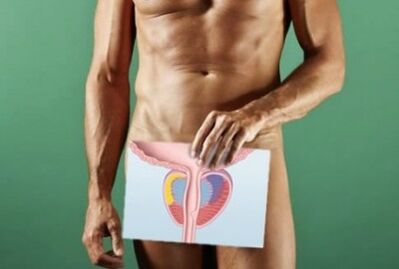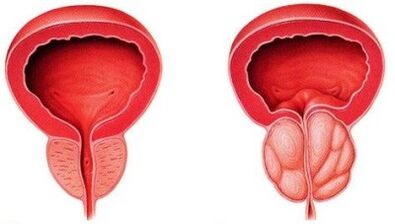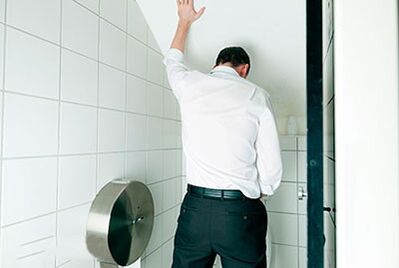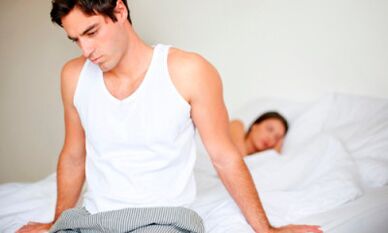Prostatitis is a disease that can suddenly afflict every man.
The urinary tract passes through the prostate gland, which contributes to the manifestation of one of the first signs of the disease - difficulty urinating.
Prostatitis - onset
The onset of illness is always associated with certain conditions in our lives.
There are several types of prostatitis:
- Acute;
- Chronic;
- Infectious (bacteria);
- Not contagious.

The nomenclature, in this case, is binary, for example, infectious prostatitis can be chronic and acute.
Each type of prostatitis will start differently and will be preceded by its own condition. Let's consider them.
Risk factors, circumstances of the incident
- STD. When infected with a sexually transmitted infection from a sexual partner, a man has a great chance of getting an acutely infected prostate, which can then turn into chronic. Therefore, venereal disease will be the first predisposing factor to prostatitis.
- Inactive lifestyle, inactive work, indifference to sports and morning exercise, obesity. This is a cause of non -infectious prostatitis, which can be exacerbated or with vague symptoms.
- Hypothermia - in this case, the genitourinary system experiences frequent cold attacks, as a result of which the bladder, seminal vesicles, prostate gland, and testicles become inflamed.
- Age. When a man is 40-45 years old, irreversible changes begin in his prostate gland. This is due to male menopause - a direct result of hormonal rearrangements in the body. Prostate enlargement (hyperplasia), which is accompanied (or may be accompanied by) the entire palette of symptoms of prostatitis.
Let’s announce it again - these factors increase the chances of getting prostatitis tenfold.

Next, let’s look at the first signs of various types of prostatitis.
Attention, before you make a self -diagnosis when the first signs are detected, or in a panic to seek medical contact - pay attention to the above risk factors. Maybe you don't have prostatitis!
Symptoms
Acute process
Let us explain that the first signs of acute prostatitis in most cases are similar in all patients:
- Pain when urinating, burning after;
- Temperature rise;
- After boldly emptying the bladder, the patient feels there is still urine in him;
- Complaints of pain in the groin and perineum.
The pain started suddenly, problems with the toilet as well. This is due to the rapid increase in swelling of the inflamed prostate.

Symptoms may disappear on their own, but do not give rise to delusions: this does not mean that the disease has passed.
Prostatitis becomes chronic. It takes a long time (many years) from the first signs of acute prostatitis to the onset of chronic prostatitis.
Chronic process
Perhaps the patient does not experience a significant acute period, and the disease, passing through it, turns into a chronic form.
In this case, the symptoms are as follows:
- Dull pain in the anus after bowel movements, radiating to the coccyx;
- Frequent or irregular groin pain;
- Going to the toilet is not difficult, but you should slightly relax your stomach to start urinating. The patient does not pay much attention to this;
- Sometimes after urination there is a burning sensation in the urethra.
The first signs of chronic prostatitis can appear over a long period of time. They can disappear, then make themselves felt again.
Infectious prostatitis
Often with infectious prostatitis, patients also carry other venereal diseases.
Among the first signs should be highlighted:
- Cuts in urethra, blood in urine;
- Temperature rise;
- Whitish urine (pus)
- Use the toilet often.
The first signs of bacterial prostatitis are similar to acute prostatitis, as the latter type often occurs precisely because of the efforts of infectious agents.

Prostatitis is not contagious
After 40 years, a man may discover the first signs of non-infectious prostatitis. This is not the fault of the bacteria, only the time has come.
The prostate is enlarged, which can somehow manifest itself, or go unnoticed.
If a man has a problem, then they experience manifestations such as:
- Difficulty urinating
- The amount of urine residue in the bladder.

If it causes inflammation of the prostate, then pain, burning and the possibility of fever will be added.
Any prostatitis has a basic (primary) manifestation in urinary problems. The pain may vary in localization and intensity, burning at the end of urination and thereafter may be absent.
Sexual problems occur in 99 out of 100% of cases, but the process is long, taking several years or more.
Among the first signs, there is a decrease in urinary pressure. If you have to strain your stomach to start urinating (even if you don’t notice it), it’s time to see a urologist.
This is the first sign of impending prostatitis.
What if you ignore all these symptoms?
Suppose acute prostatitis has passed on its own (let’s imagine that it has passed).
After a few days of torment, we easily went to the toilet again, and the burning sensation and pain had left us.
Euphoria won’t last long - chronic inflammation is tied to the prostate, so prostatitis will still remind itself.
This is not the worst thing, because you can live with such sensations. What matters is what happens in the prostate gland.
Let's remember what its function is - to maintain the vital activity of spermatozoa.
Prostatitis inhibits and restricts this function. As a result of further prostatitis, a man may lose the ability to fertilize.

Another unpleasant consequence of advanced prostatitis is depression and bad mood. Persistent toilet problems add stress to a man.
Incomplete emptying of the bladder causes an inflammatory process in it and other parts of the urinary system.
So don't be unemployed.
How is prostatitis detected?
At the first sign of illness, call your urologist and tell us about your feelings.
Prostatitis is diagnosed based on history, examination of the prostate rectum and TRUS.
The remaining methods are used in addition, to determine the corresponding disease or to exclude it.
You can make the diagnosis at home. But prostatitis can be confused with inflammation of the urethra or bladder, so read carefully the diagnosis of prostatitis.
Treatment
Treatment for prostatitis depends on its form.
The main duties of a doctor are:
- Normal ureteral recovery. This means that you need to reduce swelling, relieve muscle cramps and stimulate the production of urine and its excretion.
- Fight infectious agents or physically eliminate the cause of prostatitis.
- Relapse prevention (diet, lifestyle and good habits).
- Stimulates the activity of the prostate gland - massage the prostate rectum.
You can also be treated at home, having previously agreed on the method of treatment with a urologist. For example, it is useful to put a special microclimate with herbal ingredients.
To speed recovery, the doctor will prescribe physiotherapy.



























